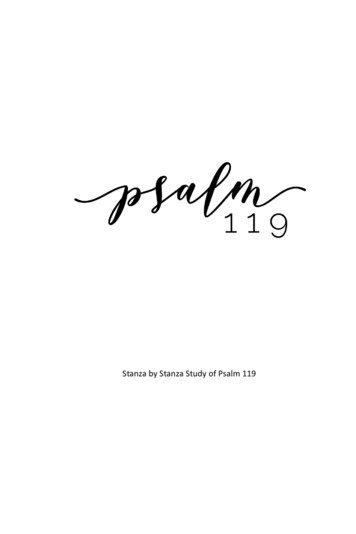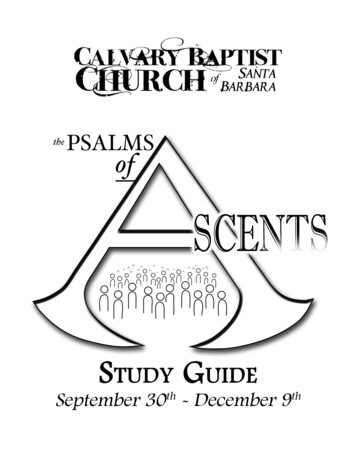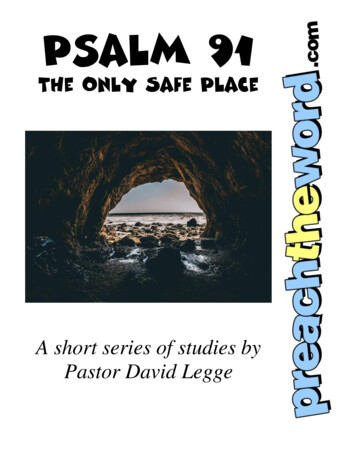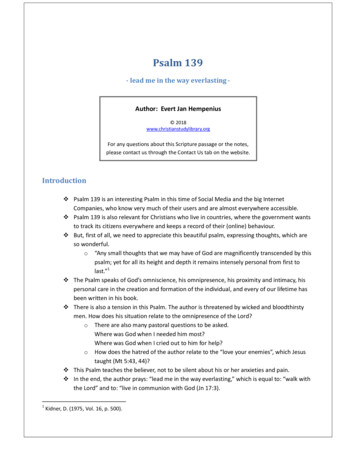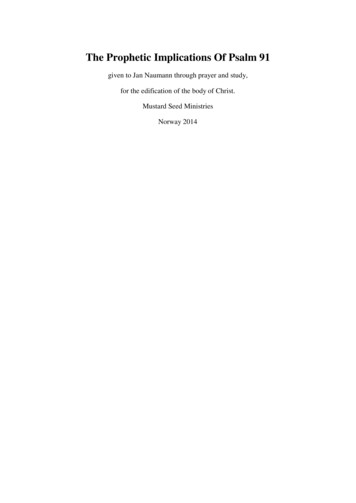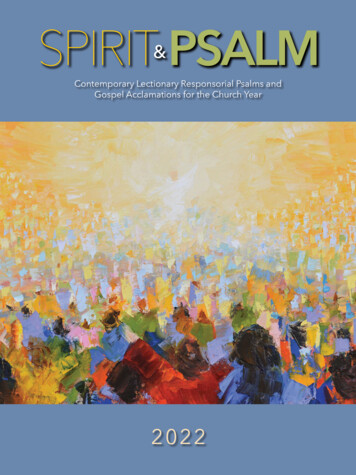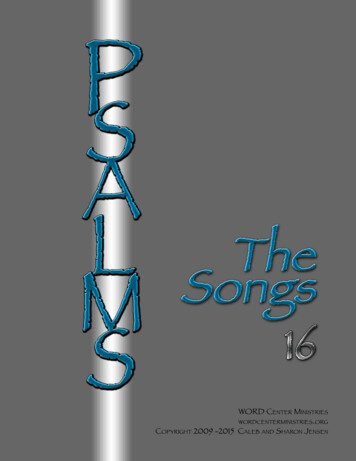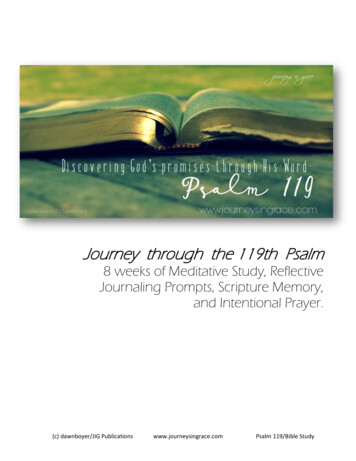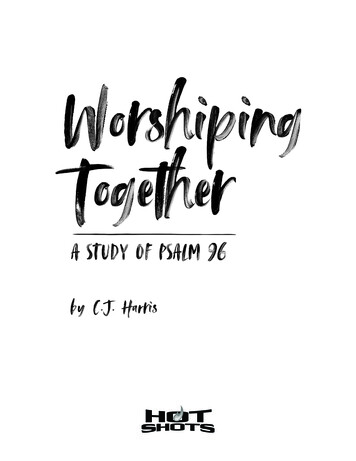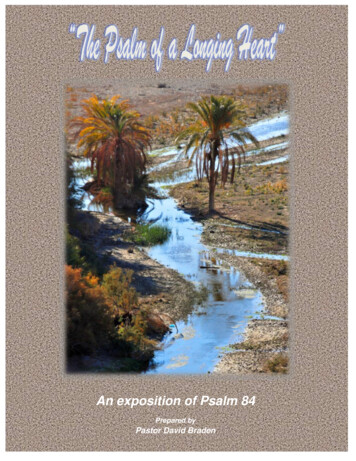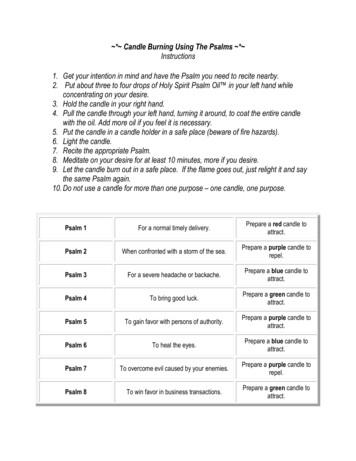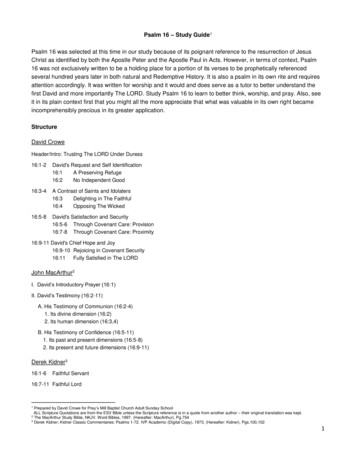
Transcription
Psalm 16 – Study Guide1Psalm 16 was selected at this time in our study because of its poignant reference to the resurrection of JesusChrist as identified by both the Apostle Peter and the Apostle Paul in Acts. However, in terms of context, Psalm16 was not exclusively written to be a holding place for a portion of its verses to be prophetically referencedseveral hundred years later in both natural and Redemptive History. It is also a psalm in its own rite and requiresattention accordingly. It was written for worship and it would and does serve as a tutor to better understand thefirst David and more importantly The LORD. Study Psalm 16 to learn to better think, worship, and pray. Also, seeit in its plain context first that you might all the more appreciate that what was valuable in its own right becameincomprehensibly precious in its greater application.StructureDavid CroweHeader/Intro: Trusting The LORD Under Duress16:1-2David's Request and Self Identification16:1A Preserving Refuge16:2No Independent Good16:3-4A Contrast of Saints and Idolaters16:3Delighting in The Faithful16:4Opposing The Wicked16:5-8David's Satisfaction and Security16:5-6 Through Covenant Care: Provision16:7-8 Through Covenant Care: Proximity16:9-11 David's Chief Hope and Joy16:9-10 Rejoicing in Covenant Security16:11 Fully Satisfied in The LORDJohn MacArthur2I. David’s Introductory Prayer (16:1)II. David’s Testimony (16:2-11)A. His Testimony of Communion (16:2-4)1. Its divine dimension (16:2)2. Its human dimension (16:3,4)B. His Testimony of Confidence (16:5-11)1. Its past and present dimensions (16:5-8)2. Its present and future dimensions (16:9-11)Derek Kidner316:1-6Faithful Servant16:7-11 Faithful LordPrepared by David Crowe for Pray’s Mill Baptist Church Adult Sunday SchoolALL Scripture Quotations are from the ESV Bible unless the Scripture reference is in a quote from another author – their original translation was kept.2The MacArthur Study Bible, NKJV. Word Bibles, 1997. (Hereafter: MacArthur), Pg.7543Derek Kidner; Kidner Classic Commentaries: Psalms 1-72. IVP Academic (Digital Copy), 1973. (Hereafter: Kidner), Pgs.100,10211
Arnold Rhodes416:1-4No Good Apart from God16:5-8The Lord My Portion and Counselor16:9-11 The Joy of Life with GodEnglish Standard Version Study Bible516:1-2The Lord Is My Refuge16:3-4My Preferred Company: The Godly16:5-6Contentment with My Chosen Portion16:7-8Delight in God’s Constant Presence16:9-11 Hope of Everlasting JoyWillem VanGemeren6A Confidence in the Lord (vv.1-4)B The Experience of Faith (vv.5-6)A’ Confidence in the Lord (vv.7-8)B’ The Experience of Faith (vv.9-11)Steven Lawson7A. David’s Prayer (1-2)1. Save me! (1)2. Satisfy me (2)B. David’s Perplexity (3-4)1. Saints are delightful (3)2. Sinners are disturbing (4)C. David’s Pledge (5-6)1. God Is my portion (5)2. God Is my inheritance (6)D. David’s Praise (7-11)1. For further instruction (7)2. For firm resolution (8)3. For future resurrection (9-10)4. For final glorification (11)James Boice816:1-2The Psalmist’s Relationship to God16:3-4The Immediate Result of the Psalmist’s Relationship to God16:5-8The Psalmist’s Present Blessings16:9-11 The Psalmist’s Future HopeThe Layman’s Bible Commentary: Psalms, Volume 9. Arnold B. Rhodes. John Knox Press, 1966 (Hereafter: Rhodes), Pgs.42-43English Standard Version Study Bible. Crossway Bibles, 2008. (Hereafter: ESV SB) Pgs.955-9566The Expositor’s Bible Commentary, Revised Edition: Psalms, Volume 5. Willem A. VanGemeren. Zondervan, 2008 (Hereafter: VanGemeren), Pg.1867Holman Old Testament Commentary: Psalms 1-75, Volume 2. Steven J. Lawson. B&H Publishing Group, 2003 (Hereafter: Lawson), Pgs. 88-898An Expositional Commentary: Psalms, Volume 2. James Montgomery Boice. Baker Books, 1994 (Hereafter: Boice), Pgs.131-134452
General Overviews“When the faithful sing Psalm 16, they entrust themselves to the Lord and foster their confidence and contentmentin his care. The psalm uses imagery from Israel’s allocation of the land (vv. 5-6) to express contentment in thislife, and goes on to look forward to everlasting life in God’s presence (vv. 9-11).”9“The focus of the psalmist is on the Lord and all of his benefits. He celebrates the goodness of God that he hasexperienced in life. It may be that he reflects on past troubles, but the thrust is on his confidence in the Lord withrespect to the future.”10“In the face of mounting adversity, David rejoices in the Lord, recounting the blessings of following him and theglory to come after death.”11Historical ContextUltimately the extent of our authoritative standing on Psalm 16’s historical context is limited to the authorship ofKing David. Beyond this there are reasonable conclusions that can be deducted from the text and reflect ourunderstanding of the dynamics of the text. Therefore, it is wise to attempt to understand the whole of the text aswell as its components before attempting to deduct a broad context in which it was written. However, this too mustbe done delicately as one’s broad context will inform some of the finer details. There is a delicate tension thatrequires wisdom and help. There is also a necessity to hold one’s conclusion with firm humility.The two major conclusions are that Psalm 16 was written by David at a time of unknown distress, hardship, orstruggle, or that it was written as a more general petition.Steven Lawson, C.F. Keil & F. Delitzsch, and I conclude that there was a precise, albeit presently unknown,historical struggle that provided the backdrop for Psalm 16. In this context of struggle, either as a fugitive or asthe seated king, it is stated that, “David boldly declared that God has been his portion in life, so he would trust himeven in death.”12 Most commentators would affirm this, but there is a clear poignancy to this if it is rooted in activestruggle.While I do not have the exact reasons that Lawson came to his own conclusion, mine will be addressedthroughout the guide in the following areas: the term “Miktam” in the header, the use of language of preservationand refuge in verse one, the reference to opposition in verse four, perhaps the use of counsel in verse seven, thereference to stability in verse eight, dwelling secure in verse nine, and not being abandoned to the grave in verseten. Obviously most of these could apply to general struggle too, save the header, the consistency of a presentstruggle with like language in other psalms, and there not being a clear reason to break with what is otherwise aconsistent pattern.Keil & Delitzsch’s argument is one of some measure of distress, and they cite verses one and ten as persuadingthem. However, their observations also include, “But there is no trace of anything like bitter complaint, gloomyconflict, or hard struggle: the cry for help is immediately swallowed up by an overpowering and blessedconsciousness and a bright hope. There reigns in the whole Psalm, a settled calm, an inward joy, and a joyousconfidence, which is certain that everything that it can desire for the present and for the future it possess in itsGod.”139ESV SB, Pg.955VanGemeren, Pgs.185-18611Lawson, Pg.8712Lawson, Pg.8613C.F. Keil and F. Delitzsch; Keil & Delitzsch: Commentary on the Old Testament, Volume 5 – Psalms. Hendrickson Publishers, 2001. (Hereafter: Keil &Delitzsch), Pg.135103
I do not think this diminishes the argument, but demonstrates grace and proper theological perspective amidststruggle – a man who is unshaken because of The LORD.Coming to a differing contextual conclusion are John Calvin and Willem VanGemeren. Calvin sees Psalm 16 as ageneral addressment of The LORD’s comprehensive protection both in life and in death – a large sweep of theprotector God.14Willem VanGemeren states that he is persuaded that the context was one of peace and quiet – likely early inDavid’s reign.15HeaderThe Header of Psalm 16 provides for us two elements: the authorship of David and that the psalm is a “Miktam.”It appears that “Miktam,” like other terms used in various Headers to Psalms, is unknown. However, because itwas used six separate times and exclusively in Davidic Psalms we can at the minimal make observationsregarding its possible use.Psalm 16Psalm 56: When David was seized by the Philistines in GathPsalm 57: When David was fleeing from Saul.Psalm 58: A precatory Psalm of David.Psalm 59: When Saul was attempting to kill David.Psalm 60: When David/Israel suffered a substantial military setback.It is my observational conclusion that the consistent usage of this term is in a context of lament and struggle,when things appear to be, and perhaps in the moment actually are, going quite badly for David, and he in turnlooks to and petitions The LORD.I am aware that a critique of making any conclusion based off of this observation are the other Psalms of Davidthat fit a like description and that do not include the term “Miktam” in the Header. However, I think the burden isnot on my deduction, but to excuse a pattern of consistency. Therefore, this is one of the primary reasons that Isee David under duress when authoring Psalm 16.16:1-2 David's Request and Self Identification16:1A Preserving RefugePreserve: guard, keep, care.For what reason is David requesting God to preserve him? We do not know, but we do know when in need ofpreservation, in need of safekeeping, in need of help David looks to God, not friends, militaries, or arsenals, but toGod.This was a reasonable request to The LORD, who is consistently testified as the God who keeps, preserves, andguards his own. David is beseeching him who is not only able, but who has shown himself faithful. Further, therequested statement is rooted in the fact that it is The LORD that David has and continues to secure his refuge his being kept from harm, opposition, and threat. The LORD is his safe place amidst these things. So he is1415John Calvin; Calvin’s Commentaries, Volume 4 – Joshua-Psalms 1-35. Baker Books, 2003. (Hereafter: Calvin), Pg.216VanGemeren, Pg.1854
effectively requesting that his refuge do what a refuge does - preserve/keep him. He is stating, preserve mebecause in you I have taken refuge - I am looking for you to fully operate as my refuge.David has affirmed with the psalmist in Psalm 118:"It is better to take refuge in the LORD than to trust in man. It is better to take refuge in the LORD than to trust inprinces." Psalm 118:8-9Regarding possible resolution to the threat, note that 16:8,9,10 appear to pick this thematic element up again - theimage of stability/security/preservation. These verses appear to be a possible answer to this request or anaffirmation of its answer.Sidebar: Preserved From Whom?I think there is reasonable grounds to conclude that David’s threat is from outside of Israel as he references thesaints in the land, the inheritance The LORD has provided him, and then in opposition to the affirmation of thepeople of God, he references idolaters who would not find a comfortable abode in the land of and kingdom of theCovenant People of God - a people who seek to be preserved by God, who is their refuge.16:2No Independent GoodDavid affirms that his only good is rooted in his Covenant God, who is also his Sovereign Lord.Here the chief sovereign of Israel (be it that he is the seated King at this exact moment or not) is stating thatthough he is the anointed king, he is subservient to the Anointing King. David is affirming that he is wholly underthe lordship, the authoritative direction and desire, and in submission to the will of The LORD.In calling The LORD his Lord, David is expressing absolute dependence on him, as a father with his child.16 Davidis declaring that he and all he possesses are the Lord’s property.17In this context of affirming The LORD’s lordship of David he goes on to affirm what Jesus would later statehimself, that it is The LORD that is good18 - there is not an independent goodness in man, on the contrary manhas an absolute lack of goodness in his fallen condition (of which Jesus had no personal deficiency from himself).Any goodness that David possesses was wholly in dependence and in association with The LORD and hisgoodness. Therefore, he is not petitioning for help, preservation, and refuge on personal merit, but on the kindmercy of God who alone is good. David, as are all people of faith, was petitioning from a deficit.Addressing David’s statement that he has no good apart from The LORD, Calvin states, “When we imagine thatthere is any good thing in us, we need not wonder if he rejects us, as we thus take away from him a principal partof the honour which is his due.”19 Effectively this is the ultimate form of stolen valor, when we attribute somemeasure of good to ourselves when it in totality comes from God.16Keil & Delitzsch, Pg.137Calvin, Pg.21718See The Gospel of Mark 10:17ff19Calvin, Pg.217175
16:3-4 A Contrast of Saints and Idolaters16:3Delighting in The FaithfulThe saints are literally, "the holy ones" - a people set apart to The LORD and for The LORD, a people notindependently set apart, but themselves set apart by The LORD. More specifically, these are the saints in theland. The reference to "the land" would have clearly been the land of covenant promise that Israel inhabited andover which David was the temporal steward. Therefore, these holy ones are a people of covenant promiseoccupying the covenant land.These holy ones are the people of Israel walking in covenant faithfulness – fulfilling the role of a people set apartor made holy to The Lord, for The LORD, and by The LORD. It is this company of people that David highlyesteems as the “excellent ones” and for whom he has set his full affection. David adores the faithful covenantpeople of God and he loves the source of their excellence, The LORD his Lord.David is demonstrating that to love The LORD is also to love his people.David also appears to be setting up a substantial contrast between the people of his delight and the people of hisopposition (who potentially are presenting some measure of threat to him). These holy ones that occupy thepromised land are referenced with strong language: excellent, mighty, majestic. It is these holy and magnificentpersons that David has directed his full delight. He has complete satisfaction in the faithful, God honoring, peopleof covenant promise - demonstrating a like affection with his LORD. By way of contrast, he has no such esteem,affection, or association with those who not only fail to recognize The LORD’s lordship, but who also fail to seethe valuable uniqueness of his deity as they apply godlike qualities to idols.16:4Opposing The WickedSorrows: suffering, wounds, and trouble There is a clear sorrow for the idolater and it is expected that those sorrows will inevitably increase. Idolatry is acostly offense and it will secure its full payment from its debtors in the form of sorrow, grief, and trouble.Contextually, we do not have as much information when identifying these offenders as we were provided whenidentifying the saints, and we cannot say definitively if they are persons within or outside of Israel. However, withthe overt reference to the saints being “in the land” and the offenders standing in immediate contrast to them, I aminclined to conclude that they are not unfaithful Israelites, but a people altogether outside of the covenantcommunity. The only tension regarding this conclusion is that it would appear that David was in close enoughproximity to them so as to make the choice to not participate or associate with their idolatry. However, while wecannot definitively state their association with Israel, we can note that they are active in their idolatrousendeavors. They are running after their own ruin.Regarding this “running after” there is some disagreement. The wording of “running after” also has the potential ofcommunicating giving a dowry or gift to the other party in the union. Calvin appears to hold to this conclusion andaccordingly makes an astute observation that in the context of idolatry the full benefit of the gift is lost and what isgained is the wrath of the one true God, and thereby their sorrows.2020Calvin, Pg.2226
Clarifying the context of this wording disagreement Derek Kidner explains that the words have the sameconsonants, but “running after” is the simpler conclusion.21 I concur with Calvin’s point if not how he got there asall is loss in idolatry and its gain is sorrow and all its terrible company.Finally, regarding the identity of these idolaters, it is quite possible that they are elements of David’s struggle inthat they overtly oppose all that is precious to him: The LORD and his people.These idolaters only have one offense identified in the psalm, but it appears to be rather vulgar as it is adefilement or mockery of the sacrificial system of The LORD. Drink Offerings were a consistent part of thesacrificial worship system that Israel was to have as a central element of the national and even personal identity,and while there was significant bloodshed in sacrifice, the drink offerings consisted of wine and strong drink.Exasperating the offense would have been taking in blood. Calvin stated that an element of the drink offeringwould include tasting it and David would have nothing to do with sampling this defiled offering of blood as was thecustom of the pagans.22Note that Jeremiah references that even idolatrous worship included drink offerings: "The children gather wood,the fathers kindle fire, and the women knead dough, to make cakes for the queen of heaven. And they pour outdrink offerings to other gods, to provoke me to anger." Jeremiah 7:18Now, as to David not taking their names upon his lips, this appears to be the idols and not necessarily theidolaters themselves. While he certainly would have abhorred the idolaters it would possibly be seen as ameasure of affirmation to so much as speak the names of the false gods and it was a practice that Israel wasdirected away from, too. “Pay attention to all that I have said to you, and make no mention of the names of othergods, nor let it be heard on your lips.” Exodus 23:1316:5-8 David's Satisfaction and Security16:5-6 Through Covenant Care: ProvisionDavid delights in The LORD's people 16:3 and here he is identifying The LORD as his chosen portion and cup16:5; these both are in contrast to his opposition to the idolaters 16:4.Regarding The LORD being David’s chosen portion, it appears that he is he effectively stating that while one doesnot choose their inheritance he chooses The LORD. It appears that he is in a way almost grafting himself into theLevites prized portion of having The LORD as their inheritance.“Therefore Levi has no portion or inheritance with his brothers. The LORD is his inheritance, as the LORD yourGod said to him.” Deuteronomy 10:9In a like manner as was observed in 16:3 where David expresses his affection for The LORD’s people and herefor The LORD himself as his portion, he seems to demonstrate his intimate fellowship with The LORD whoregards his beloved people as his own heritage. "But the LORD's portion is his people, Jacob his allottedheritage." Deuteronomy 32:9In another context David again, in distress, affirms that The LORD is both his refuge and portion, "I cry to you, OLORD; I say, 'You are my refuge, my portion in the land of the living.'" Psalm 142:52122Kidner, Pg.101Calvin, Pgs.222-2237
Also, Asaph mimics this affectionate desire that can only be satisfied in The LORD, "Whom have I in heaven butyou? And there is nothing on earth that I desire besides you. My flesh and my heart may fail, but God is thestrength of my heart and my portion forever." Psalm 73:25-26David also references The LORD as his cup. The use of cup can serve as a metaphor for provision orsustenance from God as it was provided generously in Psalm 23. 23Another matter to consider is that James Boice makes a good argument that on account of its immediateassociation with the use of cup and the later overt and independent reference to land, that “portion” here likely is adaily ration of provision for which David is giving thanks.24 Regarding this conclusion, I think that this is certainly areasonable argument, but I am not wholly compelled on account of other contextual matters, including theimmediate reference to the lot which was used for, among other things, the partitioning of land. Boice does alsoaddress the “lot,” but here also comes to differing conclusion than my own.So what does he mean "you hold my lot"? Lots were cast for making decisions and narrowing down options fromthe allotment of the land, to the identifying of Jonah on the boat, to even the selection of Judas’ replacement inthe book of Acts. The casting of the lot was a tool of identifying the details of providence. So, here too it appearsto be the item cast to determine a choice that was in the hands of providence. Therefore, I conclude that David issaying that his providential fortune is wholly in the hands of The LORD and not the luck of the lot cast, but the onewho directs its outcome. This would appear to be consistent with next referencing the boundaries and goodfortune of his inheritance. At this time, I remind you, good men differ here and to a large degree we are makingdeductions off of arguments reasoned through the available information in the text, which is a bit limited. There isa right and wrong conclusion and I hold this position with greater charity than others, but it appears consistent andaccurate to me.Sidebar: The LandNote the consistent sub-theme or at the minimal association with the land:16:3 the saints in the land16:5 my chosen portion16:5 hold my lot16:6 the lines have fallen for me16:6 a beautiful inheritanceDavid continues with great gratitude that while he would have The LORD for his inheritance, he has also been therecipient of the kind grace of a wonderful inheritance in the land of God’s covenant promise. He enjoys a range ofblessing in his faithful fellowship with The LORD and he can affirm this even in a context of struggle, unlike theidolater who can anticipate nothing but continued strife.16:7-8 Through Covenant Care: ProximityBlessing The LORD is stated to be, “ a grateful expression of acknowledgement of his blessing, hence praise.” 25It is much less frequent to see someone declaring that they are blessing The LORD, but it appears to beparticularly exuberant praise in a context of thanksgiving (delivery, provision, special care). An example of Davidblessing The LORD is found in 1 Chronicles 29 when David secures abundant provisions for the Temple of TheLORD that Solomon would build.23VanGemeren, Pg.189Boice, Pg.13325VanGemeren, Pg.190248
"Therefore David blessed the LORD in the presence of all the assembly. And David said: “Blessed are you, O LORD, the Godof Israel our father, forever and ever. Yours, O LORD, is the greatness and the power and the glory and the victory and themajesty, for all that is in the heavens and in the earth is yours. Yours is the kingdom, O LORD, and you are exalted as headabove all. Both riches and honor come from you, and you rule over all. In your hand are power and might, and in your hand itis to make great and to give strength to all. And now we thank you, our God, and praise your glorious name. 'But who am I,and what is my people, that we should be able thus to offer willingly? For all things come from you, and of your own have wegiven you. For we are strangers before you and sojourners, as all our fathers were. Our days on the earth are like a shadow,and there is no abiding. O LORD our God, all this abundance that we have provided for building you a house for your holyname comes from your hand and is all your own. I know, my God, that you test the heart and have pleasure in uprightness. Inthe uprightness of my heart I have freely offered all these things, and now I have seen your people, who are present here,offering freely and joyously to you. O LORD, the God of Abraham, Isaac, and Israel, our fathers, keep forever such purposesand thoughts in the hearts of your people, and direct their hearts toward you. Grant to Solomon my son a whole heart that hemay keep your commandments, your testimonies, and your statutes, performing all, and that he may build the palace for whichI have made provision.' Then David said to all the assembly, 'Bless the LORD your God.' And all the assembly blessed theLORD, the God of their fathers, and bowed their heads and paid homage to the LORD and to the king. And they offeredsacrifices to the LORD, and on the next day offered burnt offerings to the LORD, 1,000 bulls, 1,000 rams, and 1,000 lambs,with their drink offerings, and sacrifices in abundance for all Israel. And they ate and drank before the LORD on that day withgreat gladness." 1 Chronicles 29:10-22The pattern of blessing The LORD increases substantially in the Psalms, which is consistent with testimonies ofpraise and thanksgiving to God.26 Here in Psalm 16 David is specifically blessing or giving praise to The LORD forthe counsel he has provided him, for insight to make right choices that would honor The LORD and be to David’sbenefit. It is also possible that if David was under duress at this time that the provided counsel would have beenall the more valuable. Further, it appears that in some measure that this counsel has carried over to aninternalized wisdom that he is continuing to benefit from even in the night.David continues that The LORD is always before him, that he is at his right hand.The LORD is always before him. In this we observe that David appears to be ever mindful of The LORD and hasmade this centrality a priority – recognizing his help and hope. Lawson affirms this, stating that setting The LORDalways before him was a way of stating that David was putting The LORD in a place of undivided focus andexclusive preeminence.27 This is consistent with a man who affirms that The LORD preserves him as his refugeand is a wholly satisfying portion and his sovereign Lord.‘The LORD is at his right hand’ has provided David an unwavering security. A reference to one’s right handappears to be a position of unique authority/consequence and a position of strength. Lawson states that, puttingone at the right hand was to put one at the place of the highest exaltation.28Psalm 109 appears to draw out the position of unique authority/consequence in both negative and positive terms:Psalm 109:6 David requests that an accuser stand at the right hand of his enemy.Psalm 109:31 David gives thanks to The LORD that he stands at the right hand of the needy one to save him.Psalm 110 also demonstrates the value of this positionPsalm 110:5 "The Lord is at your right hand; he will shatter kings on the day of his wrath."26I identified that this occurs approximately 41 times in the Psalms.Lawson, Pg.8828Lawson, Pg.88279
Sidebar: Insights from Psalm 73A kindred disposition regarding a proper understanding of the wicked and the righteous can be found in Psalm 73where like themes and terms to Psalm 16 are used. Here, having evaluated the apparent advantages that thewicked presently enjoy, then seeing their larger outcome, the attention turns to the righteous:"Nevertheless, I am continually with you; you hold my right hand. You guide me with your counsel, and afterward you willreceive me to glory. Whom have I in heaven but you? And there is nothing on earth that I desire besides you. My flesh and myheart may fail, but God is the strength of my heart and my portion forever. For behold, those who are far from you shall perish;you put an end to everyone who is unfaithful to you. But for me it is good to be near God; I have made the Lord GOD myrefuge, that I may tell of all your works." Psalm 73:23-28Sidebar: David’s Role EvaluatedIt appears as though perhaps the request being stated in16:1 is resolved in 16:8-11, so how large of a role doesDavid have in this equation?16:1 I take refuge (but The LORD is the recognized preserver)16:8 I have set The LORD before me (because The LORD is at David's right hand he is unshaken)16:9 I am glad, rejoicing, and secure (in light of the preceding fact that The LORD is actively with me)16:10 Aforementioned Security/Joy further cemented with The LORD's preservation16:11 Aforementioned Security/Joy further cemented with life, joy, and pleasures in The LORD16:9-11 David's Chief Hope and Joy16:9-10 Rejoicing in Covenant SecurityDavid is glad, rejoicing, and secure. David's heart is glad, his whole being rejoices, and his flesh dwells secure inview of The LORD being before him and at his right hand.There was the clearly and consistently articulated reality for Israel that if they operated in covenant faithfulnessthere was the expectation to enjoy dwelling in their promised land securely. Living securely was therefore both asure blessing from The LORD and as applicable also a kind expectation associated with restoration - to againdwell securely in the land.David, who has wholly submitted himself in affection and subordination to the Covenant God of Israel, wasexperiencing the full personal benefits of his fellowship and safekeeping. There is not an untouched element ofhis person that is not experiencing the absolutely satisfying joy of The LORD and its accompanying security.Struggle and opposition find no safe place in their pursuit of him – he is The LORD’s.Further, the comprehensive nature of this keeping extends through his final natural breath. Because of the happydisposition and security therein, David can state that The LORD will not abandon his soul to Sheol. There are nofears of his being forsaken or separated from his Lord. David, like the saints of the land in 16:3 is The LORD’sholy one – he has been set apart to The LORD, for The LORD, and by The LORD.David identifies with The LORD both in life and in death and therefore Sheol will not have its full effects on him.Sheol: The place of the dead - a bit ambiguous and undefined in its early applications with a clear association withthe depths of the e
ALL Scripture Quotations are from the ESV Bible unless the Scripture reference is in a quote from another author – their original translation was kept. 2 The MacArthur Study Bible, NKJV. Word Bibles, 1997. (Hereafter: MacArthur), Pg.754 3 Derek Kidner; Kidner Classic Comm
